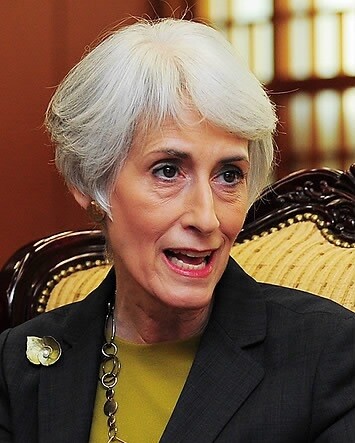hankyoreh
Links to other country sites 다른 나라 사이트 링크
[Editorial] US should reflect on its next action after inflammatory remarks

On Feb. 27, US Under Secretary of State for Political Affairs Wendy Sherman made some remarks about Japan’s problematic history that are difficult to understand. Unless the American government takes some acceptable follow-up measures, these remarks could damage relations between the US and South Korea.
“Nationalist feelings [in Northeast Asia] can still be exploited, and it’s not hard for a political leader anywhere to earn cheap applause by vilifying a former enemy. But such provocations produce paralysis, not progress,” Sherman said, obviously targeting China and South Korea.
The remarks are an enthusiastic endorsement of the position of the Japanese government, led by Prime Minister Shinzo Abe, who is not only reluctant to resolve the historical issues but in fact denies that they even exist.
It is hard to believe that this could have been said by a senior government official. In fact, Sherman is the fourth highest-ranking figure in the US State Department as well as the person in charge of setting American policy for Northeast Asia.
The fact that Sherman did not even make a formal request for Japan to apologize and show remorse clearly reveals her intentions. Sherman was implying that since China, South Korea, and Japan all have problems of their own, they should stop bringing up issues of the past.
It’s not difficult to guess why Sherman would have made such remarks. With US hegemony in Northeast Asia on the decline, it means to work even closer with Japan to push forward its policy of rebalancing Asia, which targets China. The remarks can be seen as a call for South Korea to get in line behind the US and Japan.
They also put pressure on Shinzo Abe, who is scheduled to visit the US in April, to wrap up negotiations for the Trans-Pacific Strategic Economic Partnership Agreement (TPP).
In addition to its denial of historical facts, this kind of attitude will only exacerbate conflict by making it harder to resolve the issues of the past. It also reflects the arrogant assumption that the US can do whatever it wants, regardless of the position of other countries, in order to achieve its own strategic goals.
The US government reportedly explained to the South Korean government that it has continued to express its hope that the lessons of the past will help South Korea, China, and Japan to heal their wounds and to develop forward-looking cooperative relationships.
But this is inconsistent with Sherman’s remarks. If this is the only explanation that the US provides, many South Koreans could well conclude that the US denies or even defends the wrongs committed by imperial Japan. Until now, South Koreans had assumed that the US wanted Japan to resolve the problems of the past by making an authentic apology and showing remorse so that the countries involved could move on.
To be sure, the countries of Northeast Asia must cooperate to address the issues they face, issues like North Korea’s nuclear program. But these practical concerns will never erase the problems of the past. Instead of undermining its relations with South Korea by these “hit-and-run” remarks, the US should reflect on what the right action would be.
Please direct questions or comments to [english@hani.co.kr]

Editorial・opinion
![[Column] Park Geun-hye déjà vu in Yoon Suk-yeol [Column] Park Geun-hye déjà vu in Yoon Suk-yeol](https://flexible.img.hani.co.kr/flexible/normal/500/300/imgdb/original/2024/0424/651713945113788.jpg) [Column] Park Geun-hye déjà vu in Yoon Suk-yeol
[Column] Park Geun-hye déjà vu in Yoon Suk-yeol![[Editorial] New weight of N. Korea’s nuclear threats makes dialogue all the more urgent [Editorial] New weight of N. Korea’s nuclear threats makes dialogue all the more urgent](https://flexible.img.hani.co.kr/flexible/normal/500/300/imgdb/original/2024/0424/7317139454662664.jpg) [Editorial] New weight of N. Korea’s nuclear threats makes dialogue all the more urgent
[Editorial] New weight of N. Korea’s nuclear threats makes dialogue all the more urgent- [Guest essay] The real reason Korea’s new right wants to dub Rhee a founding father
- [Column] ‘Choson’: Is it time we start referring to N. Korea in its own terms?
- [Editorial] Japan’s rewriting of history with Korea has gone too far
- [Column] The president’s questionable capacity for dialogue
- [Column] Are chaebol firms just pizza pies for families to divvy up as they please?
- [Column] Has Korea, too, crossed the Rubicon on China?
- [Correspondent’s column] In Japan’s alliance with US, echoes of its past alliances with UK
- [Editorial] Does Yoon think the Korean public is wrong?
Most viewed articles
- 1‘We must say no’: Seoul defense chief on Korean, USFK involvement in hypothetical Taiwan crisis
- 2Will NewJeans end up collateral damage in internal feud at K-pop juggernaut Hybe?
- 3[Column] Park Geun-hye déjà vu in Yoon Suk-yeol
- 4Why Korea shouldn’t welcome Japan’s newly beefed up defense cooperation with US
- 5Thursday to mark start of resignations by senior doctors amid standoff with government
- 6N. Korean hackers breached 10 defense contractors in South for months, police say
- 7[Guest essay] The real reason Korea’s new right wants to dub Rhee a founding father
- 8[Column] ‘Choson’: Is it time we start referring to N. Korea in its own terms?
- 9Kim Jong-un expressed ‘satisfaction’ with nuclear counterstrike drill directed at South
- 10[Editorial] New weight of N. Korea’s nuclear threats makes dialogue all the more urgent